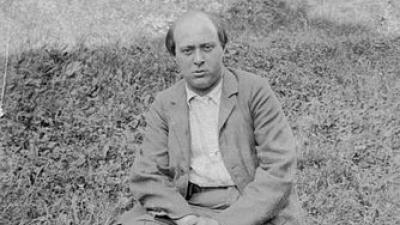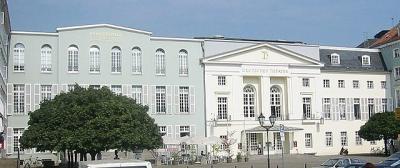To the occasional listener of symphony concerts, Arnold Schoenberg (1874-1951) is generally known as one of the boldest modernists in the history of music. Surprisingly, however, for many people who delve deeper into his biography, it becomes clear that he was anything but politically progressive.
His biographer, Willi Reich, once coined the phrase "conservative revolutionary" to describe him, and Hanns Eisler, a student of the Viennese composer, put it even more pointedly: "He is the true conservative: he even created a revolution to be able to be a reactionary." This somewhat misguided dichotomy of conservatism and reactionism can probably be attributed to Eisler's political perspective. Yet, without a doubt, the keywords "conservative" and "revolutionary" describe both Schoenberg's work and character very precisely. Schoenberg was socialized during the declining years of the Danube Monarchy and was so strongly shaped by it that he perceived its end, which certainly developed over a longer period, as a deeply transformative experience. He was undoubtedly aware of the historical importance of the year 1918. This is indicated not least by a note that refers to questions of musical aesthetics but clearly indicates societal changes through a reference to the founding year of the First Republic. He remarks:
"The age of Romanticism concluded in November 1918. As is well known. From then on, several brand-new eras began: the era of folklore, the era of rhythm, the era of anti-romanticism, the era of new classicism, and (among many others), the era of new objectivity. And one must be glad that so many better unromantic eras followed one (poor) romantic era. At least one knows: Perhaps everything may sometimes cease, but at least time does not cease."[1]
This statement reflects Schoenberg's contempt for conforming to popular trends. In his work, he once gave musical expression to this disapproval, particularly in the Three Satires, Op. 28, which all deal with compositional idioms of the 1920s and their respective representatives. The fate of some composers who continued to cultivate a somewhat romantic idiom after the end of World War I is well known: Franz Schreker, one of the most successful opera composers at the beginning of the 20th century, gradually lost the favour of his once numerous listeners. Even Richard Strauss did not enjoy the same success as he had had earlier in that period. Instead, Ernst Krenek's Johnny spielt auf, a work with jazz-like sounds, Paul Hindemith's Neues vom Tage, and, of course, the music theater of Kurt Weill became some of the most popular works on the opera stages of that time. In France, the so-called "Opéras-Minute" were created during the same period; however, in terms of their dimensions, they represented a rejection of the operatic works of the late 19th century.
The school of Arnold Schoenberg seems to contradict those composers and their works in its maxims and postulates, despite the "twelve-tone operetta" Von Heute auf Morgen. Although they did not follow the fashionable trends of their time, they were considered the forefront of the avant-garde, and the composers associated with them were seen as representatives of a music whose time had not yet come. Indeed, Schoenberg and his students considered themselves a sworn elite, and their remarks about their contemporary colleagues clearly illustrated this. What set them apart from others was a form of conservatism that is rarely encountered today, one that sought to unite artistically radical modernist positions with tradition. Musical examples of this attitude can certainly be found in Schoenberg's earliest dodecaphonic works: In the Serenade, Op. 24, the new composition technique is applied to classical forms such as the minuet and march, and even the melody Ännchen von Tharau is taken up in numerous variations.
Schoenberg never abandoned the connection to the music of the masters of past epochs. For him, disregarding the romantic era, as some composers proclaimed after the end of World War I, would have been unthinkable. He included composers like Brahms, Wagner, Mahler, and Reger in his composition lessons, and never completely rejected music history. This can be seen in his essay Brahms the Progressive and other texts on Bach, Liszt, and Mahler. The connection to past masters not only constitutes an essential element of Arnold Schoenberg's understanding of music but also characterizes the work of his most significant students, Alban Berg and Anton Webern. In Berg's music, in particular, numerous echoes of Gustav Mahler's work can be found – one need only think of the many folk song quotations in Wozzeck and the distantly heard music in the Violin Concerto. The allusions to the familiar major-minor tonality, as evidenced by these two works, secured the greatest success for the composers of the Viennese School during Schoenberg's lifetime. Webern, after the end of World War II, was seen as the only point of reference for the younger generation; his works were recognized as an approach to structure-oriented composition, or - as Karel Goeyvaerts described this - an "objectification of sound complexes." Webern's oeuvre remains enigmatic and puzzling to this day. On the musical level, he combines compositional techniques of medieval origin with an extremely strict interpretation of Schoenberg's twelve-tone technique and highly refined instrumentation. The texts he set to music include folk poets like Peter Rosegger from Styria, as well as those belonging to the forefront of the avant-garde: Georg Trakl, Karl Kraus, and Rainer Maria Rilke. His music points both to the distant past and to the future, the future that Schoenberg and Webern believed in. According to his short-time student Karl Amadeus Hartmann, the latter remarked, "My melodies will be whistled by the mailman." The head of the Viennese School, Schoenberg, was conflicted: "The second half of this century will undermine the good that the first half has preserved through underestimation."
Schoenberg's biographer Alexander Ringer pointed out that he had always found the future in the past. Schoenberg himself referred to himself as a conservative, with the added note that he "preserved progress." However, in terms of the society, such progress is not evident; he remained attached to the idea of the Danube Monarchy. When the Prince of Fürstenberg (a patron of contemporary music and founder of the still-existing Donaueschingen Music Festival) invited him to a performance of one of his works, Schoenberg responded with a letter of devotion:
"I have long admired the magnificent enterprise in Donaueschingen; that enterprise, which evokes the most beautiful, unfortunately past times of art, where the prince protected the artist and showed the mob that art, a matter of the prince, eludes common judgment. And only the authority of such individuals can, by allowing the artist to participate in the special position given by a higher power, present this demarcation tangibly to all who are merely cultivated and have striven upward, and demonstrate the difference between those who have reached a position and occupation indirectly and those who have been born directly for it. Therefore, Your Serene Highness, may I express my greatest admiration for the great achievement that the Donaueschingen chamber music performances represent in cultural life, not without being proud of the flattering reputation with which you honour me."[2]
This was not a one-time occurrence; he declined an invitation from a student to a concert at the Hofburg because it could only be issued by the emperor. He harboured great scepticism towards the newly won democracy, which perhaps can also be understood in the context of some intellectuals of that time associating the resistance to new art with liberalism. Ernst Krenek exemplified this in his essay Fortschritt und Reaktion, stating that "it is significant that even in the heyday of liberalism, progressive art like Wagner's can be enforced against the authority of liberal critics with the help of feudal factors, even though it now appears to us as a particularly perfect expression of its time." He also drew attention to a phenomenon that is still noticeable today: "Only during this bourgeois era did the standing repertoire in the opera and concert develop, which predominates today. Until then, that is, until the Vormärz period, new works were generally performed, and old ones only exceptionally, whereas today, at best, the reverse ratio is present."[3] It seems reasonable to assume that Schoenberg referred to that fact when he once wrote, "For at least a hundred years, I have been the only composer of my rank who cannot make a living from the proceeds of his work without having to earn his bread through teaching."
Schoenberg was not only a composer but also a painter, and he gained some recognition in this role as well; his works were shown in exhibitions of the Blue Rider group, and he corresponded with Kandinsky. As an author, he wrote many of the texts he set to music himself, including the libretto for his opera Moses und Aron. In addition, he had a speculative mind who produced a variety of inventions, including a four-person coalition chess game, a music typewriter, and even a transfer ticket for the tram. Musicologist Constantin Floros, well acquainted with the Viennese School through his studies of Alban Berg, once called Schoenberg a genius comparable to Richard Wagner and Leonardo da Vinci.[4] Perhaps such comparisons can be used for re-examining the connection between conservatism and artistic avant-garde and rethinking it in a completely new way.
[1] Zit. n. Scherließ, Volker: Neoklassizismus: Dialog mit der Geschichte, Kassel 1998, S. 254
[2] Schönberg an Max Egon II. zu Fürstenberg, 29. April 1924
[3] Křenek, Fortschritt und Reaktion, in: Heinz-Klaus Metzger/Rainer Riehn (Hrsg.) Ernst Křenek (Musik-Konzepte Band 39/40), München 1984, S. 5
[4] Floros, Neue Ohren für neue Musik, Mainz 2006, S. 24
Read also
Once Avant-garde: The Situation of Theatres in Germany
It is not difficult to criticize the theatre landscape based on the programs offered. However, when the discussion turns to cultural life, other questions are usually addressed. In particular, representatives of vulgar populism often mention the costs of theatres, orchestras, and other cultural institutions, usually with fervour that allows no further discussion.








Comments (0)